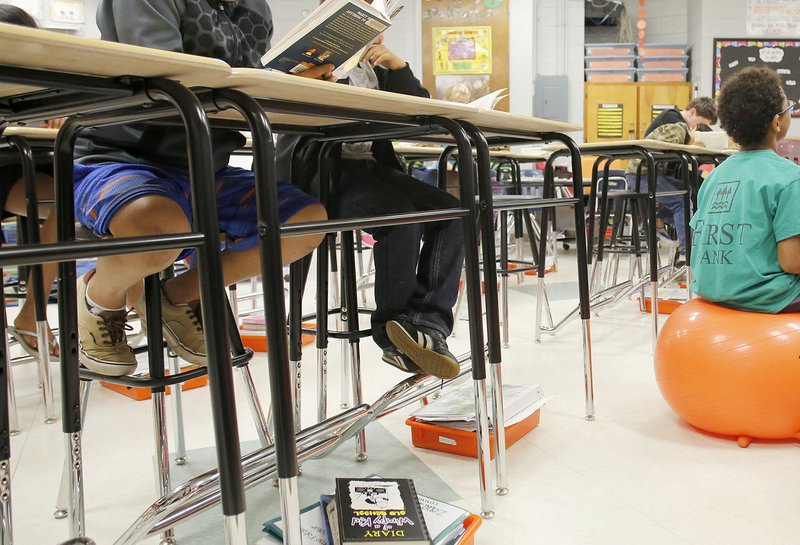Arkansas' new Educational Freedom Account program of public funding for tuition and other private school costs is funding about 5,000 students and can take 1,500 more this school year, a state Department of Education leader said Tuesday.
Darrell Smith, assistant commissioner for school choice and parent empowerment in the Arkansas Division of Elementary and Secondary Education, said the state will continue to take and approve applications from eligible students through early January.
Possibly as soon as mid-February, the state will begin taking applications for account recipients for the 2024-25 school year. As many as 13,000 students will be able to participate in the 2024-25 school year, and all Arkansas students will be eligible to apply in 2025-26.
Smith and Patrick Wolf, who is the Distinguished Professor of Education Policy and the 21st Century Endowed Chair in School Choice at the University of Arkansas, Fayetteville, fielded questions about Educational Freedom Accounts during an hour-long web event Tuesday night that was hosted by the Arkansas Reform Alliance.
Smith told the webinar audience that the formation of the account program "has not been hiccough-free" and that there has been a swirl of misinformation around it, but that it is being built on a foundation of transparency and fiscal responsibility, and that the reaction of parents has been to say thank-you.
Wolf said that his friends in other states are envious of Arkansas' quick enactment of the program, a feat he attributed to Gov. Sarah Huckabee Sanders and her team.
The Educational Freedom Accounts were created by the Arkansas LEARNS Act or Act 237 of 2023.
The 145-page act -- introduced and championed by Sanders -- revamps public education in the state, with the establishment of the Educational Freedom Account Program being one of the most dramatic provisions.
The accounts provide up to $6,672 per student for this school year -- unless the students were part of the now discontinued Succeed Scholarship Program. The former Succeed Scholarship students qualify for $7,413.
Private schools had to apply and be approved by the Education Department earlier this year to be able to accept the public funding. The 94 approved schools constitute about 70% of private schools in the state, the state has reported.
The Educational Freedom Account program will require parents -- long resigned to accepting by default their assigned public schools -- to become informed education consumers, Wolf said, and that the private schools that accept the Educational Freedom Account students must be welcoming to the account-holding students and their families.
Wolf said that a majority of studies on taxpayer-funded accounts and the related but less-flexible private school voucher programs reflect a high degree of parent satisfaction in regard to the academic rigor, school safety and access to faith traditions. There is less satisfaction with the condition of the facilities, he said.
Wolf disputed claims by opponents that taxpayer-funded tuition plans are instruments of discrimination and segregation, are a threat to democracy, and that the tax-payer funded accounts empty the coffers for traditional public schools.
Instead, he said that the taxpayer funded accounts lead to education innovation in both private and traditional public education -- even strengthening the traditional schools with competition and by leaving the traditional schools with more resources for fewer students. He also argued that extending school choice to families strengthens civic knowledge.
To be eligible this school year for the accounts, students must either be kindergartners or a student with a disability consistent with the federal Individuals with Disabilities Education Act, or attended an F-graded school or a school district that is classified as requiring Level 5 intensive support from the state.
Smith said Tuesday that the disability can be shown by the student's previously prepared Individual Education Plan for addressing a disability or a doctor's note.
Other qualifiers include being the child of a parent in active military service or a child who has experienced homelessness or foster care.
The Individuals with Disabilities Education Act, or IDEA, makes available a free appropriate public education to eligible children with disabilities, ensuring special education and related services to those children.
The categories of disability recognized by the law for student services include: autism, deaf and blindness, hearing impairments, vision impairments, emotional disturbance, intellectual disability, multiple disabilities, orthopedic impairment, other health impairment, specific learning disability, speech or language impairment, and traumatic brain injury.
While the students can qualify for the Educational Freedom Act funds by having a disability consistent with the federal law, the rules for carrying out the Arkansas Learns Act state that participation in the Educational Freedom Account program constitutes a waiver of a student's procedural rights to a free and appropriate education under the federal law.
Student users of the Educational Freedom Accounts will be required to take a standardized test, the results of which will be reported to the state. Smith said that there are multiple tests that the private schools can choose to administer from a state-approved list of tests. It may be possible for the private school students to take the state tests given annually in the traditional public schools.
